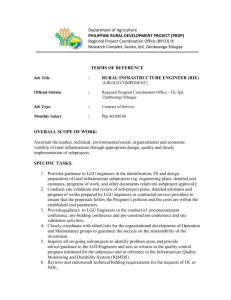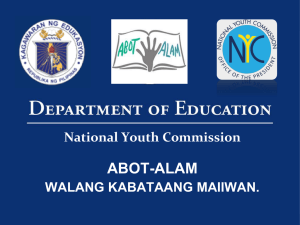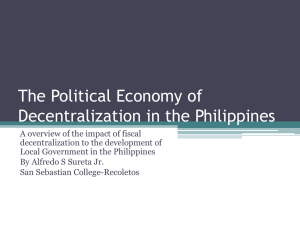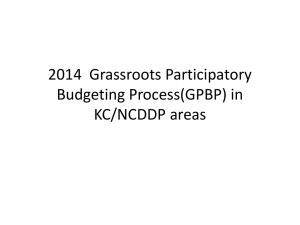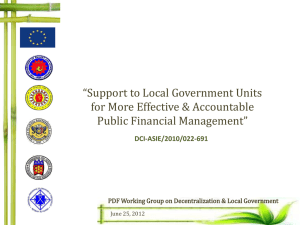Laws by Public Services Sector Applicable article / paragraph
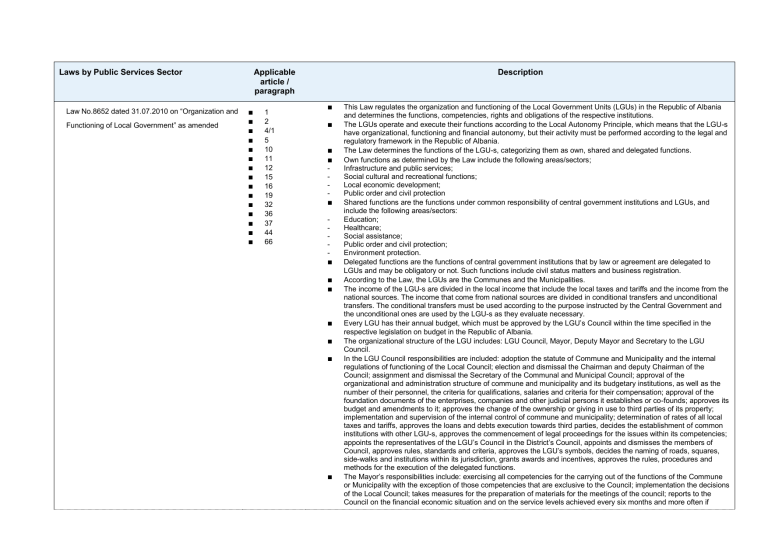
Laws by Public Services Sector Applicable article / paragraph
La w No.8652 dated 31.07.2010 on “Organization and
Functioning of Local Government” as amended
■
1
■
2
■
4/1
■
5
■
10
■
11
■
12
■
15
■
16
■
19
■
32
■
36
■
37
■
44
■
66
Description
■
This Law regulates the organization and functioning of the Local Government Units (LGUs) in the Republic of Albania and determines the functions, competencies, rights and obligations of the respective institutions.
■
The LGUs operate and execute their functions according to the Local Autonomy Principle, which means that the LGU-s have organizational, functioning and financial autonomy, but their activity must be performed according to the legal and regulatory framework in the Republic of Albania.
■
The Law determines the functions of the LGU-s, categorizing them as own, shared and delegated functions.
■
Own functions as determined by the Law include the following areas/sectors;
- Infrastructure and public services;
- Social cultural and recreational functions;
- Local economic development;
- Public order and civil protection
■
Shared functions are the functions under common responsibility of central government institutions and LGUs, and include the following areas/sectors:
- Education;
- Healthcare;
- Social assistance;
- Public order and civil protection;
- Environment protection.
■
Delegated functions are the functions of central government institutions that by law or agreement are delegated to
LGUs and may be obligatory or not. Such functions include civil status matters and business registration.
■
According to the Law, the LGUs are the Communes and the Municipalities.
■
The income of the LGU-s are divided in the local income that include the local taxes and tariffs and the income from the national sources. The income that come from national sources are divided in conditional transfers and unconditional transfers. The conditional transfers must be used according to the purpose instructed by the Central Government and the unconditional ones are used by the LGU-s as they evaluate necessary.
■
Every LGU has their annual budget, which must b e approved by the LGU’s Council within the time specified in the respective legislation on budget in the Republic of Albania.
■
The organizational structure of the LGU includes: LGU Council, Mayor, Deputy Mayor and Secretary to the LGU
Council.
■
In the LGU Council responsibilities are included: adoption the statute of Commune and Municipality and the internal regulations of functioning of the Local Council; election and dismissal the Chairman and deputy Chairman of the
Council; assignment and dismissal the Secretary of the Communal and Municipal Council; approval of the organizational and administration structure of commune and municipality and its budgetary institutions, as well as the number of their personnel, the criteria for qualifications, salaries and criteria for their compensation; approval of the foundation documents of the enterprises, companies and other judicial persons it establishes or co-founds; approves its budget and amendments to it; approves the change of the ownership or giving in use to third parties of its property; implementation and supervision of the internal control of commune and municipality; determination of rates of all local taxes and tariffs, approves the loans and debts execution towards third parties, decides the establishment of common institutions with other LGU-s, approves the commencement of legal proceedings for the issues within its competencies; appoints the representatives of the LGU’s Council in the District’s Council, appoints and dismisses the members of
Council, appro ves rules, standards and criteria, approves the LGU’s symbols, decides the naming of roads, squares, side-walks and institutions within its jurisdiction, grants awards and incentives, approves the rules, procedures and methods for the execution of the delegated functions.
■ The Mayor’s responsibilities include: exercising all competencies for the carrying out of the functions of the Commune or Municipality with the exception of those competencies that are exclusive to the Council; implementation the decisions of the Local Council; takes measures for the preparation of materials for the meetings of the council; reports to the
Council on the financial economic situation and on the service levels achieved every six months and more often if
Laws by Public Services Sector Applicable article / paragraph
Description required by the Local Council; reports to the Council on issues that are related to the functions of the municipality/commune; is a member of the Regional Council; appoints and dismisses from duty the Deputy Mayors, the managers of the enterprises and institutions under municipality or communal jurisdiction and other non-managerial employees; exercises all the rights and guarantees the meeting of all obligations of the local government due to its status as a juridical person, takes measures for the qualification and the training of the administrative personnel, returns for re-examination no more than once decision to the Council when considers them in violation of LGU’s interests.
■
The Secretary of the communal or municipality council is responsible for: maintains the official documents of the
Council; prepares the notice and agenda of the Council meetings; sends the notifications for the Council meetings; publishes any notice and decision taken by the Council; prepares the public hearings with the municipality; supervises the regulation of the functioning of the Council and other duties assigned to him by the Council.
■
The Deputy Major is appointed and dismissed by the Major of the LGU and replaces the Mayor during short periods of absence.
■
The Law determines that the reorganizational of the territorial - administrative structure in the country is made by specific law.
Infrastruc ture and publi c services
Law No.8093 dated 23.03.1996, on ”Water reserves”
Law No.8102 dated 28.03.1996, on “Regulatory framework of water supply sector and the processing and disposal of waste waters“
Law No.10463 dated 22.09.2011, on “Integrated public waste management”
■
26/2
■
5/1
■
22/2
■
23/5
■
■
12
13
■
5
■
12
■
13
■
14/2
■
22/6-10
■
27
■
This Law regulates the storage, usage and protection of water reserves in Albania.
■
Communes, municipalities and any other public or private institution, having its own system of water supply, are obliged to take measures for a regular check of the quality of water distributed. Water authorities may interrupt water distribution, which does not meet the quality standards
■
The purpose of this Law is to establish a regulatory framework and an Independent Regulatory Entity for water supply and water waste processing.
■
The LGU-s are obliged to establish, adopt, amend the fees or prices, terms and conditions of services for water sales or other services rendered by the licensee under this law, according to the Regulatory framework adopted by the Regulatory
Authority.
■
The LGU-s are obliged to establish the fees, according to the methodology of calculation of fees approved by the Regulatory
Authority.
■
The LGU-s in the capacity of owners of water supply systems, disposal and treatment of wastewater, have the right to control the subjects licensed for the implementation of this law, for adherence to license conditions and fees of water use for public consumption, imposed by the Regulatory Authority.
■
This Law regulates the protection of human health and the management of public waste.
■ Each LGU or groups of LGU’s designs the public waste management plan for the territory within its jurisdiction, according to the national plan. Each LGU determines the rules for the control of public waste management.
■
Each LGU publishes the project-plans in the internet page. The LGU’s Council approves the local plans for the integrated public waste management. The Council, when passing the respective plan takes into consideration the results of the strategic environmental assessment, opinions of authorities or relevant institutions and public opinion.
■
This Law aims to ensure sustainable development of the territory, through the rational use of land and natural resources, to evaluate the potential for the territory development, to promote the protection of the national inheritance.
■
The responsible authority for the territory development in the LGU is the LGU Council and the Mayor.
■
The LGU Council is responsible for the approval of the funds of implementation of this law. The LGU Council is responsible for: the approval of the initiative and the documents, monitoring the local plan and the legal framework, review and retrieval for review of local plans.
Laws by Public Services Sector
Law No.107/2014 dated 31.07.2014, on “Territory planning and development”
Law No.9220 dated 15.04.2004, on “Public service of funeral”
Law No.8303 dated 18.03.1998, on ”Road transport”
Law No.9244 dated 17.06.2004, on “Protection of agricultural land”
Applicable article / paragraph
■
29
■
3
■
7/1
■
10/c
■
14
■
15
■
22
■
23
■
35
■
36
■
64
■
1
■
5
■
10
Description
■
The Mayor is responsible for: the development of the local territory, taking the initiative for drafting and reviewing the documents, coordination with public institutions and allocation of HR, approval of the detailed local plans.
■
The LGU should have a qualified personnel for the implementation of this law. The minimum number of the personnel is determined with DCM, but in every case this number will not be less than 6 employees.
■
The Mayor decides to approve the local development plan within 45 days from the presentation of the documentation and after the meetings with the interested parties.
■ In case of objections, the Mayor organizes meetings with the interested parties. The LGU’s Council monitors the process and guarantees the respect of the legal procedures.
■
The Mayor is responsible for:
- decision making for planning and development permission;
- evaluation of the compliance with the legal proceedings;
- issuance of the usage certificate.
■ This Law regulates the public service of funeral in the LGU’s.
■ The LGU’s are responsible for maintenance, order and preservation of the cemeteries within their jurisdiction. The offices in the LGU’s must be equipped with a plan to scale of 1: 5000 to the existing cemetery, lying in their surrounding area. The layout should be updated annually, reflecting all the changes made. The LGU for the management of cemeteries, cooperates with religious communities.
■
In every LGU operates the funeral service. The responsible person of this service takes over and keeps every burial permit, issued by the Home affairs offices at the Municipality or Commune.
■
This Law regulates the road transport for passengers and the activity of road transport for goods.
■
The ticket fees for the urban transportation of passengers are approved by the LGU’s Council.
■
The license for urban transport is issued by the Mayor.
■
The license for interurban transport is issued by the Mayor of the LGU where the subject is headquartered. The ticket fee is approved by the LGU’s Council.
■
The places of departure and a rrival for interurban transportation are approved by the LGU’s Council.
■
In case of natural disaster or emergency, the LGU orders the temporarily usage of transport temporarily out of the previously approved lines.
■ The LGU’s Council determines the organizational of the transport by taxi. The license for this transport is issued by the
Mayor.
■ The LGU’s Council determines the level of the fees within its jurisdiction.
■
The control and supervision of road transport is under the jurisdiction of the Ministry and the offices in the LGU.
■
This Law regulates the principles, the rules and the competent authorities for the protection and improvement of the functions of agricultural land. It aims the protection and rehabilitation of agricultural land from the action of the damaging human and natural factors;
■ The LGU’s Council and the Mayor are the responsible bodies for the protection of the agricultural land, within its jurisdiction;
■ The LGU’s Council is the responsible body for the protection of agricultural land within its jurisdiction, and has the following duties:
- to control the implementation of this law;
- to issue binding decisions for the protection of agricultural land;
- to examine the reports for land damaging;
- to coordinate the activities for the land protection within the villages;
Laws by Public Services Sector
DCM No.304 dated 9.5.2012, on “The composition and the duties of the Commission for the registration of agricultural entities in municipalities and communes”
Law No.8752 dated 26.03.2001, on “Establishment and operation of structures for land protection and administration
Law No.9232 dated 13.05.2004, on “Social programs for sheltering of urban zone residents”
■
32/3
■
39
■
1
■
8
■
9
■
Applicable article / paragraph
4/2
■
7
■
9
■
31/1
■
35
■
36/1
Description
- to coordinate its activity for land protection with other LGU-s;
- to establish in its Budget the Fund for the land protection;
- to examine the appeals presented from individuals and legal entities.
■
The Mayor has the following duties:
- to govern and control the operations for the land protection;
- to report in the Commission of Land Protection for the situation in the LGU’s territory;
- to implement the decisions and instructions of the Commission of Land Protection for territory within its jurisdiction.
■
This DCM provides the composition and the duties of the Commission for the registration of agricultural entities in municipalities and communes.
■
The Commission for the registration of agricultural entities in the LGU-s is headed by the Mayor and has the following members:
- the responsible of the civil status service office;
- the responsible of the social service office;
- the responsible of the urban office;
- a representative from Institute of Statistics of Albania (the ‘INSTAT’);
■
The Commission has the following duties:
- approves the work program for the Commission in the LGU;
- appoints the interviewers selected on the basis of selection criteria;
- organizes the work for the training of the surveyors and the technical assistance provision;
- organizes periodic inspections and follows the process of registration;
- reports to the Commission of the registration in the District and to INSTAT;
- provides the necessary facilities for the coordination of work of the interviewers;
- organizes the process of preservation and delivery of the materials of the registration to INSTAT.
■ This Law regulates the principal rules for the administration of agricultural land and the state structures in the LGU’s, their responsibilities and their function.
■
The structures of land protection and administration in the LGU’s, for their responsibilities report to the LGU’s Council.
■
The office of land protection and administration in the LGU has the following responsibilities:
- prepares and presents for approval in the LGU the queries and the documentation for lease, permits or other forms of rights transfer;
- collects and preserves the documentation.
■
This Law provides the rules and procedures for securing, administration and planning of social programs for sheltering.
■
The LGU-s manage the social programs for sheltering and determine the priorities.
■
Each LGU provides in the territory under its jurisdiction an area of land for the construction of a sufficient number of social housing for rent, based on population size and composition for the social groups.
■
Administration and maintenance of social housing rent is determined by the LGU council. Apartments for rent, as a rule, are administered by licensed managing entities.
■ The LGU’s Councils approve annually the amount of annual rent for social housing, expressed in ALL / sqm building area.
■ The LGU’s Councils approve the 10-year sheltering programs for the population within their jurisdiction, drafted by the respective offices in the LGU’s.
■ The LGU’s for the management of the sheltering programs:
- identify the needs for sheltering;
Laws by Public Services Sector
Law No.10112 dated 09.04.2009, on ”Administration of coownership in the residential buildings”
■
38
■
40
■
14
■
15
■
19
■
23
■
24
■
37
■
43
Law No.9270 dated 29.07.2004, on ”Addresses system”
■
1/1/3
■
3
■
4/1/1
■
4/1/3
■
28
Social, cultural and recreational functions
Law No.10352 dated 18.11.2010, on “Art and
Culture“
■
5
■
23/1
■
28
■
29
■
31
■
32
Applicable article / paragraph
Description
- draft 10-year sheltering programs;
- provide the infrastructure according to the sheltering programs;
- ask for subventions from the Ministry;
- create and administer the data of the families who benefit from the sheltering programs;
- determine the maximum costs for the constructions;
- provide the construction, administration and the maintenance of the buildings;
- notify the Ministry for the continuance of the sheltering programs;
- other functions provided by law.
■
This Law regulates the administration of co-ownership in the residential buildings that are in an obligatory ownership.
■
The LGU can draft a program for the restoration and the reconstruction of the damaged buildings. The LGU can contribute partly in the financing for the construction of a new building, when the co-owners decide for demolition, provided that the ownership is transferred to the LGU. The LGU’s Council decides the Procedures, deadlines and the Fund.
■
The Mayor upon request of one co-owner should convey the assembly of co-owners if this assembly has never been conveyed.
■
The LGU-s should establish and maintain a co-ownership register where are registered the headship of the co-ownership
■
The LGU-s should establish and keep the register of administrators (individuals or commercial companies)
■
The Mayor is entitled to assign an administrator for a co-owned building which assembly is not conveyed or has not contracted a registered administrator.
■
The LGU-s should determine and supervise the standards for health, fire protection, building maintenance, applicable by each co-ownerships
■
The LGU-s inspectorate should inspect the application of the law in their territory
■
The Mayor is responsible for the application of the law for those building not registered with the Real Estate Registry Office and the construction company is declared bankrupt.
■
This Law regulates the system of addresses in Albania, the criteria for the naming processes and the institutions in the jurisdiction in the LGU’s.
■ Naming of boulevards, roads, streets, squares and parks in the LGU’s is made by decision of the LGU’s Council, under whose jurisdiction they are located, while the numbering of buildings, entrances and apartments is made from sections and planning offices in the LGU-s, under the jurisdiction of which they are located.
■
Every LGU creates, updates and administrates the data in the Local Register of Addresses.
■
The methods of creating and administration of the Local Register of Addresses is regulated with DCM.
■
This Law provides the principal rules, the organization, function and financing of art and culture and the duties of the responsible persons.
■
In the LGU-s are established the institutions of art and culture.
■
The local institutions of art and culture are budgetary institutions, established by the LGUs, depending on them. The LGU’s
Council approves the Statute of the local institution of art and culture. The composition of the artistic board of the local public institution is approved by the LGU’s Council. The Board members have four-year term and are renewable. The seat of the local institution is in the LGU. Also the LGU’s Council appoints the Head of the institution, with the proposal of the Mayor.
■
The labour relationship of the employees is governed by the Labour Code of Albania and other legal acts.
Laws by Public Services Sector Applicable article / paragraph
Description
■ The LGU’s Council approves the usage of the Funds for the local public theatres.
Law No.9048 dated 07.04.2003, on “Cultural
Heritage in the Republic of Albania ”
Law No.9376 dated 21.04.2005, on “Sport”
Law No.64/2012 dated 31.05.2012, on ”Fishing”
■
1
■
6
■
30
■
34
■
■
27/2
■
38
■
8/2
40/3
■
40/5
■
46
■
This Law regulates the protection of cultural heritage in the Republic of Albania;
■
The LGU-s are responsible for the tracing, protection, conservation, restoration, treatment, research and inventory of cultural heritage objects;
■
The LGU-s are entitled to propose to the Ministry, the proclamation of a object as cultural heritage;
■
The LGU-s collaborate with the Culture Monuments Institute and Archaeological Institute for the protection of cultural heritage, within their jurisdiction.
■
This Law aims the protection of the rights of the citizens who practise physical education and sport, the competent authorities in this field, the rules and organisation of sports in Albania.
■
The LGU drafts and guarantees the local policies in the sport field and the strategies for sport development, establishes the competent institutions, manages the sportive objects etc.
■
The public sportive objects are owned by the LGU-s within their jurisdiction. They are responsible for maintenance, reconstruction and built of new objects.
■
Sportive competitions are organised by the sport organisations or the LGU-s. The organisation of these races must be notified to the LGU, within its territory is being organised.
■
This Law regulates the fishing activity, the management and the protection of marine life.
■
For the amateur fishing, the competent institutions for verification of permits criteria are the LGU’s bodies.
■
The authorization for amateur fishing is issued by the LGU.
■
The competent body in the LGU cooperates its work with the Fishing Inspectorate (institution of dependence of the relevant ministry of line) and national fishing associations to control the complement of the criteria for the fishing permits.
Local economic development
DCM No.358 dated 01.06.2012 on ”The security in the sea, beaches and internal waters in the inland territory”
Law No.9734 dated 14.05.2007, on “Tourism”
■
Section II,
Article 4
■
5
■
7
■
11
■
■
15
18
■
This DCM provides the rules for the protection of the sea, beaches and internal waters and the competent authorities for the implementation of this DCM.
■
The LGU-s are the competent authority for the planning, implementation and the security in the beaches, during the summer session.
■
The LGU-s has the following duties:
- identifies the recreational areas, in cooperation with other institutions;
- approves the public usage of the beaches;
- approves and removes the permits for the public usage of the beaches for individuals or companies;
- approves in cooperation with the Sea General Directory the areas of public usage, distances, schedules, signals etc;
■
The LGU-s in cooperation with the Sea General Directory and the State Police are responsible for the verification of the legality and patrolling the shoreline and the control of the security and hygienic measures.
■
The LGU-s prepares an inventory of the permits issued, dates of inspection and controlling the security measures
■
This Law determines the principles and rules which operate in the tourism field, also the implementation and development of the standards in the touristic services.
■
The LGU-s as provided by the law, have the following duties:
Laws by Public Services Sector
Law No.10253 dated 11.03.2010, on “Hunting”
Law No.10006 dated 23.10.2008, on “Protection of wild fauna”
Law No.10465 dated 29.09.2011, on ”Veterinary service in the Republic of Albania”
■
■
■
■
■
■
■
■
■
Applicable article / paragraph
21
22
47
1
54/3
57
40/2
40/4
44
Description
- establishment of the inventory of the touristic sources in the LGU and to provide them to the competent Ministry
- to provide technical assistance for the establishment of the touristic businesses
- to supervise the implementation of the legal provisions
■
The LGU-s are responsible for the cooperation of work between the LGU-s and public institutions engaged in the development of the tourism within their territory.
■
The income provided from the fines is shared between the Local Government and the State Budget
■
This Law regulates the management of the hunting in Albania, the principles in exercising this activity and the protection of wild fauna species.
■
The technical and organisational units in the LGU-s are responsible for the development of hunting and extracting data according to the monitoring hunting program, within their jurisdiction.
■
Forest guards and other control administrative structures of the LGUs are responsible for enforcement of the requirements of this law on proper hunting and detecting wrong-doings illegal hunting practices.
■
This Law regulates the protection, management and control of wild fauna, with the aim to protect the species, populations and habitats, where they live.
■
The control bodies of the LGU-s are responsible for the protection of the wild fauna in the habitats within the yellow line, and in the habitats in the LGU’s propriety.
■
For the effectiveness of the control, the LGU-s cooperate with the Fishing Inspectorate, forest guard and veterinary inspectors.
■
The control bodies in the LGU-s, must take measures in case of administrative contraventions.
■
The control bodies in the LGU-s monitor and control the implementation of the policies approved by the Ministry of
Agriculture.
■
15/1
■
18/1
■
■
19/5
16/1/a
■
This Law aims to protect and improve the health of animals, to protect the public health from the diseases transmitted from animals and damaging substances, to ensure the implementation of veterinary health measures for animal products.
■
The veterinary structures in the LGU-s have the following responsibilities:
- to collaborate with the regional veterinary structures to implement prophylactic measures;
- to determine the place and to manage the living animals markets;
- to determine the pastures and water drinking places;
- to control the structures for the sale of animals;
- to take measures for the siege of wastewaters and to prevent the entry of animals there;
- to organize the collection of the dead animals and to determine the landfills;
- to perform veterinary service in the slaughterhouses;
- to notify the competent authority for food safety in cases in slaughterhouses are verified violations of the veterinary standards.
■
The standards of the veterinary service of the LGU-s and the duties are determined with DCM.
■
Section I to
X of the
DCM
■
The LGU-s exercise the functions of the veterinary service through the veterinary structures, composed by veterinary doctors;
■ The LGU’s comply their veterinary structures with veterinary doctors, in accordance with the number of population;
■
The veterinary structures of the LGU-s have the following duties:
- collaborate with the regional veterinary structures for monitoring the situation;
- determine the place and to manage the living animals markets;
Laws by Public Services Sector
DCM No.230 dated 20.03.2013, on “Determination of functions, duties and structures of the veterinary service of the LGUs”
Applicable article / paragraph
Law No.9385 dated 04.05.2005, on “Forests and forest service”
■
1/1
■
19/2
■
20/4
■
20/7
■
21/9
■
22/2
■
23
Description
- determine the pastures and water drinking places for the animals;
- the duties specified in the Law on “Veterinary service”;
■
The veterinary structures in the LGU-s collaborate with the regional structures and the National Food Authority for the implementation of the prophylactic measures.
■
The veterinary services in the LGU-s determine and administer the places of living animals markets, within their jurisdiction;
■
The veterinary services in the LGU-s perform veterinary service in the slaughterhouses, before and after the slaughter of the animals.
■
The veterinary service in the LGU-s monitor and take under control the homeless cat and dogs.
■
The veterinary service controls and manages the structures of the sale of animals.
■
This Law determines the rules for the relationships, duties, rights and responsibilities of the public institutions, LGU-s, NGO-s and other subjects for the protection, administration, management and usage of national forest fund, forest land and natural and biological sources;
■
The LGU-s owns and administer the public forest fund, within their jurisdiction. The LGU-s are responsible for the administration, protection and development of the forest fund, in cooperation with the forest service institutions, owners and other institutions;
■
The LGU-s in agreement with the Forest Service General Directory, are entitled to receive in use of public forests, out of their administrative borders, for the needs of their population;
■
The LGU-s and other subjects who perform different activities in the forest fund, are responsible for the protection and administration of the forest fund, within their jurisdiction, regardless of the form of ownership;
■
In case of fire, each LGU and other subjects too, have the responsibility to notify and to participate in the fire suppression.
The LGU-s are responsible for the prevention of fire in the territories within its jurisdiction;
■
The LGU-s approve the permits for: different activities performed in the forest fund, within its jurisdiction, such as; grass shearing, pasturage etc;
■
In the LGU-s are established technical-administrative issues, for a stable and multi-functional development of the forest fund, within their jurisdiction;
■
The LGU-s are responsible for planning and taking measures for investing in the forest fund, within their jurisdiction. The
LGU-s annually, plan funds for protection, maintenance and development of forestall works.
Public Order and Protection
Law No.10279 dated 20.05.2010, on ”Administrative contraventions”
■
6
■
7/3
■
8/1
■
9
■
This Law determines the rules for the examination of the administrative contraventions and the deadlines and procedures for the appealing.
■
The administrative contraventions are determined by
- law; or
- decision of LGU’s Council for contraventions that are not specified in laws and are part of the LGU’s activity.
■ The Mayor is the competent body for reviewing the administrative contraventions, determined by the LGU’s Council;
■
When the competent administrative body for the administrative contravention examination ascertains any administrative contraventions, may decide the punishment by fine or other administrative measures;
■
The decision for the administrative contravention, is executed by the administrative body that has issued it. When this body has not executive structures, the decision is executed by the Bailiff Office.
Laws by Public Services Sector Applicable article / paragraph
Law No.9780 dated 16.07.2007, on “Inspection and protection of territory from illegal constructions”
■
3
■
4
■
5
■
13
■
18
Law No.10433 dated 16.06.2011, on “Inspection in the Republic of Albania”
Law” No.8224 dated 15.05.1997, on “Organization and functioning of Municipal and Communal Police
DCM No.313 dated 01.07.2002, on “Determining the structure, the number of employees, and the expenses for the Municipal and Communal police”
■
■
■
■
■
■
2
14
19
20/1
2
17
■
10
■
11
■
14
■
19
Description
■
This Law aims to secure the respect of rules, standards and legislation in the field of construction, urban planning and water reserves.
■
The control of enforcement of law and technical standards in the field of construction and urban planning is carried out by the
Inspectorate of protection of territory in the LGU-s.
■
In each LGU is established the Inspectorate of protection of the territory, The inspectorate is headed by its chief inspectors and is responsible for the territory control and enforcement of legislation in the planning and development territory field.
■
This Inspectorate has the following duties:
- decides the compliance of the legal duties;
- imposes fines according to the legal provisions;
- proposes the removal of professional license, in case of illegal construction;
- decides the suspension of works;
- decides the demolition of the illegal constructions;
- files criminal charges against the responsible persons;
- provides information/documentation to the National Inspectorate of territory protection;
- decides the indemnification of the offender;
■
The LGU Council decides the establishment of the Inspectorate of protection of the territory, within 3 months from entry into force of this Law.
■
This Law regulates the general principles of the inspection, the organization of public institutions who have inspection functions, the status of the inspectors and the rules of the administrative proceedings.
■ The LGU’s Council decides the creation of the Inspectorate for the functions provided by law. The Local Inspectorate is managed by the Local Inspector.
■
The Mayor of the LGU supports the functioning of the local inspectorate. The Mayor decides the annual objectives of the local inspectorate and the specific indicators of the effectiveness of the local inspectorate. The Mayor is legitimated to ask for information, documents and reports for a specific case. The Mayor can ask in a motivated order the beginning of an inspection for a specific case.
■
The labor relationship of the inspectors are governed by the legislation on civil servant.
■
This Law regulates the organization and functioning of Municipal and Communal Police in the Republic of Albania.
■ The LGU’s police has the following structure:
- The inspector – The Head of the police section in the LGU;
- polices.
■
The structure of the Municipal and Communal Police, the number of employees, the salary levels and the expenses are decided by the Decision of Council of Ministers.
■
This DCM regulates the structure of the Municipal and Communal Police, the number of employees, the salary levels and the expenses for each LGU.
■
The Municipality Ura Vajgurore – Inspectors 1, polices 3 – Total 4
■
The Commune Kutalli
– Inspectors 1, polices 2 – Total 3
■
The Commune Poshnje – Inspectors1, polices 1 – Total 2
■
The Commune Cukalat – Inspectors 0, polices 1 – Total 1
■
The Municipality Pogradec
– Inspectors 1, polices 8 – Total 9
■
The Commune Bucimas – Inspectors 0, polices 2 – Total 2
■
The Commune Cerrave – Inspectors 0, polices 1 – Total 1
Laws by Public Services Sector
Law No.8756 dated 26.03.2001, on ”Civil emergencies”
Law No.8766 dated 05.04.2001, on “Protection from fire and salvation”
■
5/1
■
24
■
■
■
Applicable article / paragraph
15
16
17
Description
■
The Commune Dardhas – Inspectors 0, polices 1 – Total 1
■
The Commune Hudenisht
– Inspectors 0, Polices 2 – Total 2
■
The Commune Proptisht – Inspectors 0, polices 2 – Total 2
■
The Commune Trebinje – Inspectors 0, polices 1 – Total 1
■
The Commune Velcan
– Inspectors 0, polices 1 – Total 1
■
This Law regulates the planning and withstanding of civil emergencies in the Republic of Albania.
■
The Mayor of the LGU is responsible for planning and withstanding the civil emergencies, within its jurisdiction;
■
The Mayor has the following duties:
- to govern and control the organisation and function of works for the management of civil emergencies, within its jurisdiction;
- to collect and process the data of the LGU for the implementation of the planning projects of civil emergencies;
- to organise the notification process of the population in case of danger;
- to provide for the necessary sources and the funds for withstanding the civil emergencies;
- to perform the organisation, coordination and the provision of operational forces;
- to follow the rehabilitation from the natural disasters;
- to submit a query for help from other LGU-s in case of necessity;
- to organise the planning and withstanding of civil emergencies;
- to implement the tasks assigned by the structures of civil emergencies;
- to appoint the director of the emergency operation.
■
In each LGU, under the direction of the Mayor is established the Local Commission of civil emergencies, with tasks in coordinating the LGU’s actions and voluntary organizations in planning and withstanding civil emergencies. The Minister of
Local Government determines the organisation and structure of this Commission.
■
The planning and withstanding of civil emergencies is financed by the State Budget. Other sources of financing may be the
Local Budget.
■
This Law provides the rules for the protection form fire and salvation and the competent authorities for the implementation of this Law.
■ In each LGU, by Council’s decision is established the stations for the protection from fire and salvation, in cooperation with other authorities.
■
The LGU-s has the following duties:
- ensure the implementation of the provisions of this law and take measures for protection from fire and rescue the facilities;
- finance the establishment of the stations for protection from fire;
- plan the Funds for the improving of the infrastructure;
- issue decisions and orders for the activity in the fire protection;
- collaborate with foreign partners and donators for technical assistance in the protection form fire;
- provide the organizational and technical measures and the Fund for the protection from fire and salvation;
- analyze the security measures and order their improvement;
- control the organization and functioning of the fire stations;
- ask and provide help with vehicles, equipment and personnel in case of fire and emergencies.
Laws by Public Services Sector Applicable article / paragraph
Education
Law” No.69/2012 dated 21.06.2012, on “Pre-university educational system in the Republic of Albania ”
■
28
Healthcare
Law No.10107 dated 30.03.2009, on “Health care in the Republic of Albania”
■
5
Description
■
This Law regulates the basic principles for the structure, the activity and the governing of the pre-university educational system in Albania;
■
The LGU is responsible for improving the quality of educational service for the pupils in the educational institution, according to the Albanian legislation;
■
The LGU-s have the following duties:
- construction and reconstruction of the buildings of the public educational institutions;
- to guarantee the integrity of the educational institutions, within their jurisdiction;
- protection and maintenance of public educational institutions;
- to guarantee hygienic and sanitary conditions and heating in the public educational institutions.
■
The LGU, in cooperation with the local educational institutions is responsible for the registration of the pupils in the full time obligatory educational system. The LGU, in cooperation with the local educational institutions and t he Teacher’s Councils supports the category of pupils in difficulties.
■
This Law determines the basic principles and the legal framework for the regulation, organization and functioning of health care system in Albania.
■ According to the Law on “Local Government”, the LGU-s have the following duties:
- to create and prevent a healthy environment within their jurisdiction;
- to administer the health care institutions, in their property;
- to be included in the policies and health care institutions, within their jurisdiction;
- to offer financial aid for the health care institution.
■
The LGU-s exercise administrative control for the health care activity in the territory they administer;
■
The LGU-s in cooperation with the Health Ministry, take measures to secure primary health care services for the population, within their jurisdiction.
Social Assistance
Law No.9355 dated 10.03.2005, on “Social Assistance and services”
■
2
■
17/1
■
18/3
■
20
■
29
■
This Law regulates the social assistance and services for the individuals and categories in need;
■
The LGU-s administrate the social services provided for the population within their jurisdiction;
■
The LGU-s enter in a contractual relationship with the subjects who will offer social services within the territory in their jurisdiction;
■ The financial aid is approved every month by the LGU’s Council decision;
■ The LGU’s Council may approve specific criteria for the financial aid assistance;
■ The LGU’s Council has the following responsibilities:
- approves the funds of social services and the number of families in need;
- drafts the plan for the social service development plan;
- approves and supports the social service development plan;
Laws by Public Services Sector
Law No.9669 dated 18.12.2006, on ”Measures against domestic violence”
■
5/2
■
7/4
Law No.10347 dated 04.11.2010, on “Protection of child’s right”
■
■
32/3
39
Applicable article / paragraph
Description
- decides the financial aid for the categories in need;
- sets the right and the extent of the financial aid;
- authorises the contractual relationships with the licensed subjects that will offer the social services;
- approves the programs of financial aid;
- approves the structure of subordinate institutions, which offer social services;
- approves cooperation programs with NGO-s, religion i nstitutions and civil society’s representatives.
- to p ropose in the LGU’s Council the families in need and to prepare the documentation;
- to participate in the drafting of project-decisions and to calculate and propose the amount of the financial aid:
- to valuate the needs of the applicants for financial aid;
- to collaborate in the drafting of local plans and to create statistics, documents and to save the register of the beneficiaries
■
In the LGU-s are established the respective structures for the administration of civil status and financial aid programs.
■
This Law aims the prevention and reducing the domestic violence in all its forms, through appropriate legal measures and the protection of the family members against domestic violence.
■
The competent authorities in the implementation of this Law are also the LGU-s, which have the following duties:
- creation of the social services in case of domestic violence;
- installation of a telephone number 24 hours in case of emergency;
- establishment of social centres for the rehabilitation of domestic violence victims.
■ This Law provides the rules for the protection of child’s rights and the competent bodies for the implementation of this Law.
■
The competent bodies in the local level are the Units for child protection in the LGU-s, which have the following duties:
- to evaluate and monitor the situation of the families of the children in danger;
- to identify and coordinate the situation for the protection and the analysis of the cases within its territory;
- to inform the community for the child’s protection;
- to collaborate with the administrators of the social services, the school’s psychologists and other responsible authorities;
- to serve as an information center for the families and children in need;
- to report periodically to the State Agency for the child’s rights protection;
■
In the LGU-s are established the multidisciplinary units for the protection of child’s rights and the analysis of the cases of the families and children in danger, within its territory.
■ In the Child’s protection Unit in the LGU must be at least one employee trained in social works.
Environmental protection
Law No.8906 dated 06.06.2002, on ”Protected areas”
■
15/1
■
18/1
■
19/5
■
16/1/a
■
1
■
5
■
8
■
This Law regulates the storage, usage and protection of protected areas in Albania, facilitation of conditions for tourism development, information and education of the public for the protected areas.
■
The Environment Ministry, the public institutions and the LGU-s, draft for each protected area the management plan.
■ Protected areas are those areas that might be public property, LGU’s property and in specific cases private property.
■
The LGU-s in cooperation with other institutions prohibit the implementation of the projects or activities with impact in the environment against with the management plan.
■
The Ministry, while drafting the management plan of the protected areas, must take i n consideration the LGU’s opinion.
■
This Law aims the protection of the transboundary lakes in their natural condition, the guarantee of the suitable conditions for the development of life and ecosystems, promoting the necessary activities, according to the stable development principle;
Laws by Public Services Sector
Law No.9103 dated 10.07.2003, on ”Protection of transboundary lakes”
Applicable article / paragraph
■
20
■
21
Description
■
The LGU-s in cooperation with the Ministry and other institutions, organizes its work for the protection and development of the transboundary lakes.
■ In the LGU’s Council meetings, when discussing the lake decisions, must participate the business community’s representatives and NGO-s;
■ The LGU’s in cooperation with the Ministry, scientific institutions and NGO-s are responsible for the administration of the lakes according to the management plans, drafted from the Ministry;
■ The LGU’s Police, in cooperation with Water Authority and other Inspectorates controls the implementation of the provisions of this Law.
Civil status matters
Law No.10129 dated 11.05.2009, on “Civil status services”
DCM No.1299 dated 16.12.2009, on “Determining the structure, the number of employees of the civil status services in the LGU-s
■
■
62
63
■
Schedule no.2
■
This Law determines the components of civil status services to Albanian citizens, foreign citizens and stateless persons, the rules for the storage and amendment of data and the rules for organization and functioning of civil service in Albania.
■
In the LGU-s are established the civil status service offices. The structure and organics of the civil status service offices is determined by Decision of Council of Ministers.
■
The income provided by the civil status service offices are distributed according to the DCM. The LGU-s may finance the civil service in order to improve the quality of this service.
■
This DCM determines the structure and the number of employees of the civil status services in the LGU-s, as follows:
■
The Municipality Ura Vajgurore – 1 responsible– Total 1
■
The Commune Kutalli – 1 responsible – Total 1
■
The Commune Poshnje
– 1 responsible – Total 1
■
The Commune Cukalat – 1 responsible– Total 1
■
The Municipality Pogradec – 1 responsible, 2 employees – Total 3
■
The Commune Bucimas
– 1 responsible, 1 employee – Total2
■
The Commune Cerrave – 1 responsible– Total 1
■
The Commune Dardhas – 1 responsible– Total 1
■
The Commune Hudenisht – 1 responsible– Total 1
■
The Commune Proptisht – 1 responsible– Total 1
■
The Commune Trebinje – 1 responsible– Total 1
■
The Commune Velcan – 1 responsible– Total 1


